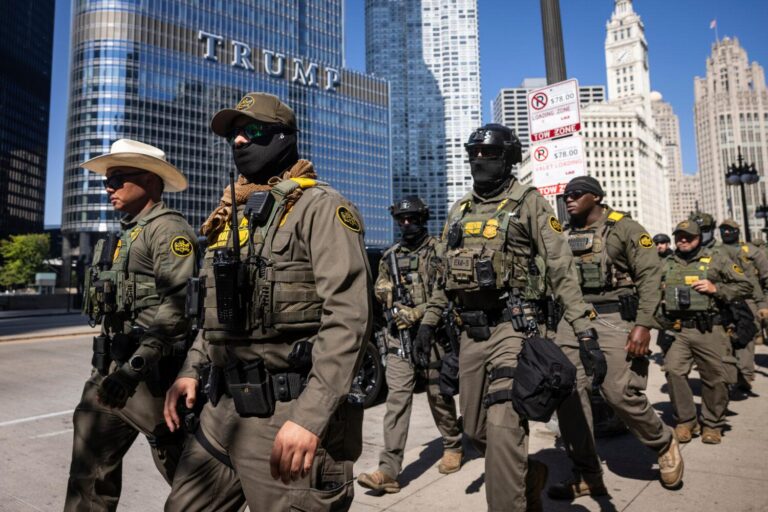In a surprising turn, President Donald Trump has announced a pause in the deployment of federal agents to San Francisco, signaling a temporary retreat from his administration’s aggressive approach to urban law enforcement in the city. The decision comes amid escalating tensions and widespread criticism over the use of federal personnel in local jurisdictions, with the president stating, “OK, I’ll give you a chance.” This move raises questions about the future of federal intervention in sanctuary cities and the broader national debate over public safety and federal authority.
Trump Halts Federal Agent Deployment in San Francisco Amid Rising Tensions
Following weeks of heightened public outcry and political debate, the administration has decided to halt the deployment of federal agents to San Francisco. This decision comes amid growing concerns about the impact of the agentsŌĆÖ presence on community relations and city governance. Officials have communicated a willingness to give local authorities more time to address underlying public safety issues without federal intervention disrupting ongoing dialogues.
Key factors influencing the pause include:
- Escalating tensions between federal officers and local demonstrators
- Calls from San FranciscoŌĆÖs mayor and city council for de-escalation
- The administrationŌĆÖs intention to avoid further politicization of law enforcement efforts
| Aspect | Previous Status | Current Status |
|---|---|---|
| Federal Agent Presence | Active deployment across key areas | Deployment paused indefinitely |
| Community Impact | Increased protests and unrest | Expectation of reduced confrontations |
| City-Federal Coordination | Strained and contentious | Opening for dialogue and cooperation |
Analysis of Federal Intervention Impact on City Safety and Local Governance
The recent decision by the federal administration to pause the deployment of agents to San Francisco has stirred mixed reactions among local officials and residents. Proponents of the intervention argue that federal involvement could reinforce law enforcement capabilities, particularly in curbing the surge in property crimes and violent incidents that have alarmed many city dwellers. However, critics highlight concerns regarding the erosion of local governance autonomy and the potential for strained community-police relations when outside agents operate without full municipal oversight.
Key dynamics emerge when analyzing such federal interventions:
- Safety metrics: Temporary dips in certain crime categories may be observed post-deployment but tend to fluctuate once agents withdraw.
- Governance tension: A notable increase in friction between city officials and federal authorities, complicating coordinated efforts.
- Community perception: Polarization spikes, with some residents feeling reassured while others perceive an overreach and militarization of public spaces.
| Impact Area | Positive Effect | Negative Effect |
|---|---|---|
| Crime Reduction | Temporary enforcement boost | Short-lived without local support |
| Community Trust | Increased sense of safety for some | Distrust and alienation for others |
| Local Governance | Potential for stronger federal-local partnerships | Undermining of city authority |
San Francisco Officials React to Pause in Federal Law Enforcement Presence
San Francisco’s city leaders have expressed cautious optimism following the federal government’s announcement to pause the deployment of law enforcement agents. Mayor London Breed stated that the decision allows the city to focus on community-led initiatives aimed at addressing public safety concerns without the pressure of federal intervention. Similarly, Police Chief Bill Scott emphasized the value of collaboration and communication with federal authorities rather than unilateral actions, noting that local strategies should remain at the forefront.
However, some officials urge vigilance given the unpredictability of federal policies. The Board of Supervisors highlighted key priorities moving forward:
- Enhancing community policing efforts to rebuild trust between residents and law enforcement.
- Investing in violence prevention programs that address root causes of crime.
- Monitoring federal involvement closely to ensure accountability and respect for local governance.
| Stakeholder | Reaction | Next Steps |
|---|---|---|
| Mayor London Breed | Supportive of pause | Focus on community safety |
| Police Chief Bill Scott | Encourages collaboration | Increase local partnerships |
| Board of Supervisors | Cautious vigilance | Maintain oversight |
Navigating Federal and Local Collaboration Moving Forward
Recent developments indicate a subtle shift toward finding common ground between federal authorities and San Francisco city officials. By pausing the deployment of federal agents, the federal government signals a willingness to explore more cooperative ventures instead of unilateral actions. This gesture opens the door for constructive dialogues, emphasizing community-oriented strategies over confrontational approaches. Both parties are under pressure to address crime and public safety effectively, aiming to balance enforcement with respect for local governance and civil liberties.
Critical to progress in this collaboration will be establishing clear roles and communication channels. The following elements are emerging as focal points in the ongoing negotiations:
- Joint task forces combining federal resources with local insight
- Shared data platforms to improve crime tracking and responsiveness
- Community engagement programs that reinforce trust
- Mutual accountability measures to ensure transparency and respect for jurisdictions
| Collaboration Factor | Status | Next Steps |
|---|---|---|
| Federal Agent Presence | Paused | Review city feedback |
| Information Sharing | Partial | Develop joint platform |
| Community Initiatives | Limited | Expand outreach programs |
To Conclude
As the Trump administration temporarily halts the deployment of federal agents to San Francisco, the decision marks a notable shift amid escalating tensions between the city and the federal government over law enforcement approaches. Whether this pause will lead to a lasting resolution or further negotiations remains to be seen. For now, the administrationŌĆÖs move signals a willingness to reassess its strategy, while local officials continue to advocate for solutions that balance public safety with community trust. Stay tuned for more updates on this developing story.




